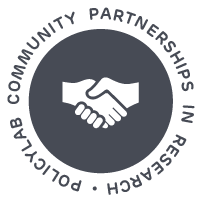The Partnership Development and Joint Pilot Project Awards are accepting applications through April 6, 2026 at 5pm. Please note this opportunity is intended for Children’s Hospital of Philadelphia employees.
About the Program

Launched in 2022, PolicyLab’s Community Partnerships in Research Program funds community-engaged research pilot grants. The program seeks to promote health equity in the Greater Philadelphia area by building and deepening community-academic partnerships for research targeting health improvements among children and their families.
Through two grant mechanisms, the program promotes capacity-building at Children’s Hospital of Philadelphia (CHOP) for community-academic partnered research and the conduct of translational research using best practice in community-engaged research methods, while supporting the next generation of health equity researchers.
Two grant mechanisms are available in this program:
(Application period now open through April 6, 2026) Partnership Development Awards provide seed funding to support activities related to the development of new or emerging community-academic research partnerships.
(Application period now open through April 6, 2026) Joint Pilot Project Awards are geared towards established community-academic partnerships who seek funds for a well-defined research project that may produce preliminary data or programs for future competitive grant applications. Joint Pilot Project Awards will be supported for a maximum of $40,000 for up to two years (resource specifics subject to change).
How to Apply
Click here for application details. Application instructions for the Partnership Development Award are here. Application instructions for the Joint Pilot Project Award are here.
Program Contacts
Dr. Meredith Matone, Director, MatoneM@chop.edu
Dr. Tanisha Belton, Program Manager, BeltonT@chop.edu
Dr. Jennifer Whittaker, Training Lead, WhittakerJ@chop.edu
Follow along in this video as we host recipients of our CPIR awards to celebrate their accomplishments, hear updates from their work and share lessons learned from conducting innovative and thoughtful research.
Year 4 Awardees
Partnership Development Award
Improving Neonatal Outcomes at Nyangabgwe Hospital, Francistown, Botswana
Partnership: Sarah Maclean, MD, CHOP pediatrician will partner with Unangoni Bulawayo, MD at Nyangabgwe Hospital, Francistown, Botswana.
Project Description: This project focuses on understanding the factors associated with neonatal mortality at a hospital in Botswana. This award is PolicyLab's first CPIR award to a CHOP physician and an international partner.
Year 3 Awardees
Joint Pilot Grant Awards
Addressing the Needs of the Local Spanish-Speaking Autism Community
Partnership: Kate Wallis, MD, MPH, from PolicyLab and CHOP’s Department of Developmental and Behavioral Pediatrics will partner with Yovana Bustamante from Posibilidades Infinitas
Project description: The team will conduct a community needs assessment and then action the development of accessible, Spanish-language educational materials. This award is sponsored in partnership with CHOP’s Clinical and Translational Research Award (CTSA) program. The mission of CHOP's CTSA is to provide resources, environment, operations, and training to support and promote high-quality clinical and translational research by qualified investigators.
Empowering the Next Generation: Evaluating the Impacts of a Community-based Student Teaching Program on Young Leaders and Their Communities
Partnership: Hillary Kapa, MPH, from CHOP’s Center for Injury Research & Prevention and Stephanie Garcia, MPH, from PolicyLab and CHOP’s Center for Injury Research & Prevention will partner with Matthew Kerr and Christopher Thornton from Beyond the Bars
Project description: The team plans to conduct an evaluation of an established youth leadership development program, Beyond the Bars Student Teacher Program, which serves as a student-led music enrichment program for middle and high school students aimed to interrupt cycles of violence and combat disinvestment in Philadelphia. This award is sponsored in partnership with the Health Equity Research Methods (HERMes) Initiative, which aims to advance health equity research and translation across CHOP and CHOP Research Institute.
Voices from SisterSong: Reproductive Justice and Severe Fetal Conditions in Communities of Color
Partnership: Abigail Wilpers, PhD, from PolicyLab and CHOP’s Neonatology Health Services Research Lab will partner with Simran Singh Jain from SisterSong, The Women of Color Reproductive Justice Collective
Project description: The team will use focus groups to understand health care experiences of individuals of color who have experienced a pregnancy complicated by a severe fetal condition and will disseminate findings in a multimedia exhibition to guide reflection and action. This award is sponsored by the Health Equity Research Methods (HERMes) Initiative, which aims to advance health equity research and translation across CHOP and CHOP Research Institute.
Partnership Development Award
Supporting Engagement in Perinatal Supports for Pregnant Individuals with SUD
Partnership: Yuan He, MD, MPH, MSHP, from PolicyLab and CHOP’s Department of Pediatrics will partner with Colette Green, MSS, from Maternity Care Coalition
Project description: The team will work to identify facilitators and barriers to service and resource linkages for families impacted by substance use disorder (SUD) in Philadelphia through the development of a community advisory board of stakeholders who serve birthing parent-infant dyads impacted by perinatal SUD. This award is sponsored by the CHOP Cancer Center Diversity Committee.
Year 2 Awardees
Joint Pilot Grant Awards
Building Communication Strategies Among Black Fathers and Their Youth: A Pilot Study to Develop and Disseminate Strength-based Parent-Teen Resources
Partnership: Jillian Lucas Baker, DrPH, EdM, from CHOP’s Craig-Dalsimer Division of Adolescent Medicine’s Center for Parent and Teen Communication, and Joel Austin from Daddy University Inc.
Project description: The team plans to examine the barriers and facilitators for Black fathers’ communication with their teens (ages 12-17) about coping strategies for discrimination, racism, and mental health needs via focus groups and survey administration. They will then use these findings to develop and test the effectiveness of a parenting intervention for Black fathers in Philadelphia.
Adaptation of the Students Talking About Relationships (STAR) Curriculum for LGBTQI Youth
Partnership: Marné Castillo, PhD, MEd, and Bevin Gwiazdowski, MSW, PolicyLab members from CHOP’s Adolescent Initiative and the Craig-Dalsimer Division of Adolescent Medicine, and Sydney Rolle-Stern, MPH, from the Lutheran Settlement House
Project description: The team seeks to address interpersonal violence among LGBTQI adolescents and young adults through the application of the ADAPT framework to modify and test the evidence-based intervention, Students Talking About Relationships, using implementation and qualitative research methods. This award is sponsored in partnership with the CHOP Clinical and Translational Research Award (CTSA) program. The mission of the CHOP CTSA is to provide resources, environment, operations, and training to support and promote high-quality clinical and translational research.
A Multimodal Approach to Exploring the Adultification of Black Girls and the Building of Community-Centered Dissemination of Findings
Partnership: Daniela Brissett, MD, and Nadia Dowshen, MD, MSHP, PolicyLab members from CHOP’s Craig-Dalsimer Division of Adolescent Medicine, and Tawanna Jones, EdD, from we R.E.I.G.N: Rooting, Empowering, and Inspiring a Girl’s Nation
Project description: The team aims to understand the impact of adultification on the medical and mental health outcomes of adolescents in an urban setting. More specifically, they will gather youth and their families' perspectives utilizing semi-structured qualitative interviews and innovative qualitative arts-based methods, such as photo-elicitation exercises, to identify the current experiences and potential solutions.
Partnership Development Award
Community Guided Development of an Interprofessional Neonatal Intensive Care Unit (NICU) Equity Champion Team and Bias Mitigation Strategies
Partnership: Diana Montoya-Williams, MD, MSHP, PolicyLab member from CHOP’s Division of Neonatology, and Jenné Johns, MPH, from Once Upon a Preemie, Inc.
Project description: The team aims to form a community- and family-engaged, interdisciplinary team of ‘NICU Equity Champions’ who will collaboratively build a multi-institutional research agenda focused on mitigating the impact of implicit bias and racism in the CHOP and Hospital of the University of Pennsylvania NICUs.
Year 1 Awardees
Joint Pilot Grant Awards
Defining and Implementing Trauma-Informed Approaches: Bridging the Academic-Community Divide to Support Community-based, Youth Serving Programs
Partnership: Rachel Myers, PhD, MS, from the Center for Injury Research and Prevention (CIRP) at CHOP and the Center for Violence Prevention (CVP) at CHOP, and Ronna Kassel from Christian Street YMCA
Project description: The team will support, implement, sustain, and evaluate the impact of trauma-informed approaches within 16 branches of the Greater Philadelphia YMCA. Overall, this project will specifically address how to create competence and confidence among program staff to deliver community-based programming in trauma-informed ways.
Partnership Development Awards
Strengthening Partnerships to Elevate Home Visiting Community Voice
Partnership: Tara Dechert, MS, from PolicyLab, and Shukriyyah Mitchell, BSN, RN, from the National Nurse-Led Care Consortium
Project description: The team will build a parent and family advisory council that would ensure the community of home-visited clients’ voices are incorporated in all implementation efforts including recruitment and outreach efforts, and research and quality improvement. From this work, their goal is to develop pathways that can be replicated across systems and organizations to allow clients and the home visiting community to lead and partake in future research and decision-making processes.
A Multimodal Approach to Exploring the Adultification of Black Girls and its Impact on Medical and Mental Health Outcomes
Partnership: Daniela Brissett, MD, and Nadia Dowshen, MD, MSHP, PolicyLab members from the Craig Dalsimer Division of Adolescent Medicine at CHOP, and Tawanna Jones, EdD, from we R.E.I.G.N.: Rooting, Empowering, and Inspiring a Girl’s Nation
Project description: The team will explore, through personal narratives, the lived experiences of adolescent youth who identify as Black and female aged 13-25. They hope this project will create a better understanding of how Black girls respond to institutional stereotypes but also to examine existing resilience skills used in their everyday lives.
A Collaborative Approach to Building a Menstrual Hygiene Product Distribution Site Within a Pediatric Hospital-based Food Pharmacy
Partnership: Shelby Davies, MD, PolicyLab member from the Craig-Dalsimer Division of Adolescent Medicine at CHOP, and Lynette Medley, MEd, from No More Secrets Mind Body Spirit (MBS) Inc. and the SPOT Period
Project description: The team will create a research partnership infrastructure between CHOP’s Division of Adolescent Medicine at CHOP, The Food Pharmacy at CHOP, and No More Secrets MBS Inc. and The SPOT Period. This first-of-its-kind partnership will aim to better understand the relationship between food insecurity and period poverty as a means for developing a menstrual product distribution program within a food pharmacy, which is a food bank and education center aiming to reduce hunger and improve health by making nutritious foods readily available to patients and their families.
Resources
Balazs CL, Morello-Frosch R. The three r's: how community based participatory research strengthens the rigor, relevance and reach of science. Environmental Justice. 2013;6(1). doi: 10.1089/env.2012.0017
Carleton University. Community Based Research Toolkit. https://carleton.ca/cspsc/research-toolkit/
Andrews JO., Newman SD, Cox MJ, Meadows O. Are we ready? A toolkit for academic-community partnerships in preparation for community-based participatory research. Charleston: Medical University of South Carolina. 2011.
Northwestern University Feinberg School of Medicine. Alliance for Research in Chicagoland Communities (ARCC). Community-Engaged Research Funding & Grantwriting Tips and Strategies. https://www.feinberg.northwestern.edu/sites/cch/get-support/arcc/index.html
Treem JW, Schneider M, Zender RL, Sorkin DH. Exploring the potential role of community engagement in evaluating clinical and translational science grant proposals. Journal of Clinical and Translational Science. 2018;2(3):139-146. doi: 10.1017/cts.2018.311
Jenkins C, Fagan HB, Passarella J, Fournakis N, Burshell D. Training academic and community investigator teams for community-engaged research: program development, implementation, evaluation and replication. Progress in Community Health Partnerships. 2020;14(2):229-242. doi: 10.1353/cpr.2020.0019
Paberzs A, Piechowski P, Warrick D, et al. Strengthening community involvement in grant review: insights from the Community-University Research Partnership (CURES) pilot review process. Clinical Translational Science. 2014;7(2):156-163. doi: 10.1111/cts.12141
Data for Democracy: Community Partnerships Organization Chart
Practicing Pikyav: Policy for Collaborative Projects and Research Initiatives with the Karuk Tribe
Nápoles AM, Stewart AL. Transcreation: an implementation science framework for community-engaged behavioral interventions to reduce health disparities. BMC Health Services Research. 2018;18(1):710. doi: 10.1186/s12913-018-3521-z
Payán DD, Zawadzki MJ, Song AV. Advancing community-engaged research to promote health equity: considerations to improve the field. Perspectives in Public Health. 2022;142(3):139-141. doi: 10.1177/17579139211054118
National Institutes of Health. Principles of community engagement second edition. (NIH Publication No. 11-7782) 2011.
Duke University. A Researcher’s Guide to Community Engaged Research: What is CEnR? https://guides.mclibrary.duke.edu/CENR_researchers/home
